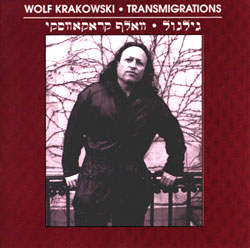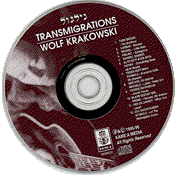Wolf Krakowski's "Transmigrations"
If you mention "Yiddish Music" in a company acquainted with so called World Music, you may be more or less assured of this reply: "Ah, you mean Klezmer". However, it's a fact that Klezmer today experiences much the same crisis that once made New Orleans Jazz stiffen into Dixieland. Many of today's executioners of Klezmer Music are lacking in improvisational skills and are actually not rooted in that wonderfully modulated, almost shimmering, language that begat it: Yiddish. Allow me to introduce Wolf Krakowski, a guitarist and blues-singer from Toronto, Canada, now residing in Northampton, Massachusetts, who is firmly anchored in Yiddish.
What Krakowski has done with his debut-CD, "Transmigrations" (Kame'a Media
KAM 7001), is simply to unite those two traditions: eastern Jewish culture
and the music of blues-rock-reggae. It may sound risky and would have been
so in the hands of a less conscious
In an interview I have made with him via e-mail, he relates how he once at the beginning of the Klezmer-revival experienced how a musician executed a "Yiddish blues" as a pure parody. "I couldn't understand why all the wonderful music of these both forms should be misrepresented in such a way." The thought that he himself should show what one could do with this grew organically. "First and foremost, the blues is my music. What have all these mazurkas and bulgars and quadrilles that klezmer is based on to do with my daily life?"
That may sound disrespectful in the ears of a "klezmer-purist", but the
fact is that Krakowski handles his material on "Transmigrations" with a
deep respect. Here we encounter some Ashkenazi popular, folk, and
"Alts geyt avek mitn roykh / Umzist denk ikh dreystu dayn moykh / Far vos is dayn loyen / Vos bekamstu derfar? / (…) Az alts geyt avek mitn roykh?" ("Everything goes up in smoke / I think you rack your brains for nothing. / What is it worth? / What do you get out of it? / (...) When everything goes up in smoke?) There are more pearls of the Ashkenazi song-treasure on "Transmigrations": Witler's invocation of the lost Warsaw ("Varshe"), "Friling" ("Springtime"), an almost unendurably beautiful song from the ghetto of Vilna, "Ven du lakhst" ("When you laugh") with its eternal wisdom, the traditional "Shabes,"Shabes", executed here as a rocking reggae, "Her nor, du sheyn meydele" ("Listen Pretty Girl"), which features a thrilling duet between Krakowski and sweet-singing Fraidy Katz, and the mystical, exhilarating "Zol shoyn kumen di geule" ("Let the redemption come"), with its biting last line: "Please see that the Messiah doesn't come a little bit too late".
You don't have to hear many seconds of the of the opening number of this
CD, the traditional ballad "Tsen Brider" ("Ten brothers") to grasp that
Wolf Krakowski has created something unique. American
Such a singular and odd musical creation as "Transmigrations" has of course attracted attention in the Jewish musical world of the US. Praise has been legion, but Krakowski has found no luck with the big record-distributors. You can read more about him and order his CD at Kame'a Media. There is a European distributor too.
Speaking of this distant part of the world, Krakowski also has a connection
to Sweden. He is the son of Polish Jews (thus Yiddish is his first language)
and was born in an Austrian Displaced Persons' Camp called Saalfelden Farmach
in 1947. Shortly afterwards his family migrated to Sweden and settled down
in the outskirts of the Swedish town Eskilstuna ("My first baby-sitter
was a one-eyed former seaman, called Arvid. I remember big rats and that
my Mom plucked chickens
Later on, he was raised in a working-class district of Toronto, known as "the Junction", went on the road as a musician and a "luftmentsch" (person without a definite occupation), played with Big Joe Williams and other blues-legends, dug deep into his own, partly disappeared Yiddish culture, and then - when it all in due time came together - produced this profoundly original and universal testimony "Transmigrations" - a slap in the face to revisionists of all kinds.
Ingemar Johansson
Program of "Transmigrations": Tsen Brider (Ten Brothers)
In all more than 60 minutes
of wonderful music.
The musicians: Wolf Krakowski - Vocals, rhythm guitar THE LONESOME BROTHERS: Jim Armenti - Guitars, mandolin,
violin, bouzouki, saxophone
and Daniel Lombardo - Percussion
Go to Wolf Krakowski's own site |

